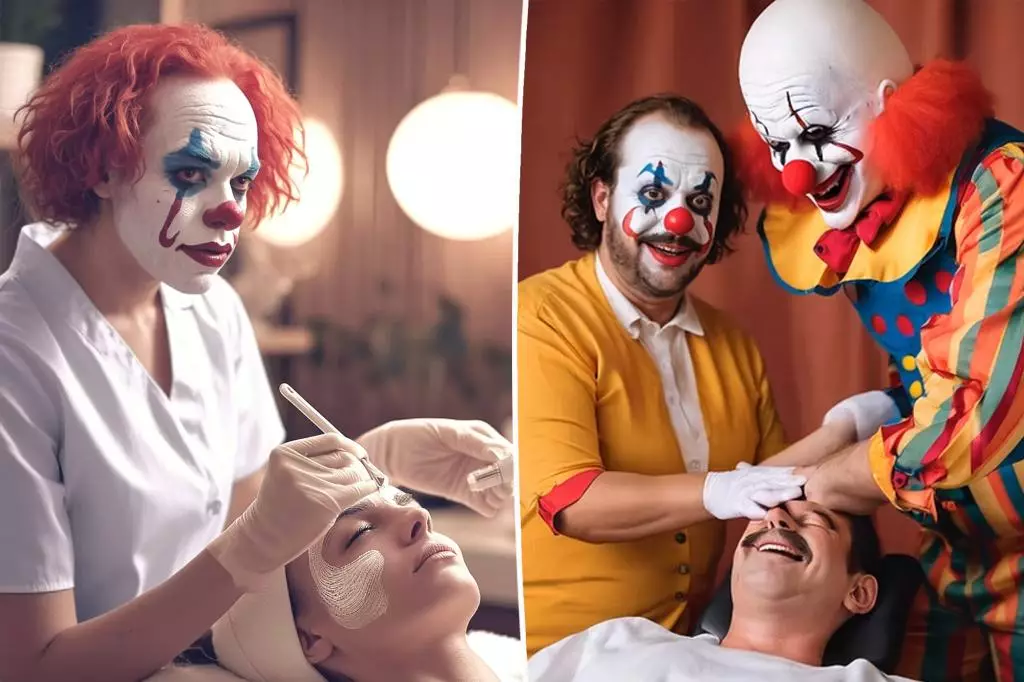In the high-stakes realm of East Hampton’s summer scene, where luxury and extravagance often intermingle with an eagerness for wellness trends, an anonymous collective has emerged, blending humor with the dizzying activities of the wealthy elite. Enter the increasingly surreal world of “clown therapy,” where seasoned performers don oversized shoes and painted smiles to offer a unique take on health and relaxation. What makes “East Hampton Clown Massage” so provocative is not merely the absurdity it presents but the biting commentary it subtly delivers on the state of wellness culture today.
This initiative, albeit cheeky in nature, acts as a clever critique of the wellness industry that has become increasingly saturated with outlandish claims and practices. With a website showcasing clowns dutifully dishing out massages on sun-drenched beaches, it’s impossible to ignore the layers of social satire that lie beneath the surface. The creators demonstrate that they possess a profound understanding of Hamptons lore, providing a well-crafted narrative that seems to overflow with local inside jokes and references that ring true to the affluent crowd.
A Playful Poke at Prestigious Personas
The creators, who have cleverly blurred the lines between comedy and critique, have chosen to parody prominent figures from the local scene while highlighting the absurdities of celebrity culture. For instance, they feature a fictional testimonial from “Lizzie G., socialite and Mercedes owner,” a humorous nod to the infamous public relations figure Lizzie Grubman. Such references are not mere throwaways; they serve to accentuate the peculiar intersection between wellness practices and social status, revealing how the elite might engage with even the silliest trends as a status symbol.
The offered treatments, such as “Scream” and “Joeky Reiki Bakey,” resonate with the often playful yet serious nature of self-care methods that abound today. By linking these bizarre therapies to the more conventional practices of meditation and reiki, the satire highlights the elasticity of the wellness narrative. The treatment termed “Scream” suggests a release of pent-up emotions under duress from the pressures of high society while “Joeky Reiki Bakey” offers a comically outrageous approach to healing that combines dieting practices with pun-laden engagement.
Merchandising Madness and Absurdity
On top of the comedic massage offerings, the anarchic website boasts a lineup of faux products that depict the extremes of consumerism within wellness culture. The “sold out” clown make-up remover priced at $250 adds an extravagant touch, underscoring how serious some individuals take their wellness rituals. The absurdity of substantial prices attached to hilariously unrealistic items challenges viewers to consider the sometimes ridiculous lengths to which they may go in their pursuit of self-care and personal fulfillment.
Characters like “Joeky,” a fictitious expert boasting an Ivy League education, reinforce this humorous examination of social identity. With a résumé that includes making balloon replicas of iconic landmarks, owning several Tesla Cybertrucks, and being a self-proclaimed thought leader in cryptocurrency, “Joeky” exemplifies the unique blend of comedy and critique, inviting reflection on both modern wellness trends and consumer identities. Such exaggerations effectively highlight how far removed some individuals can become from essential well-being in their aspirations to attract prestige.
The Culturally Rich Backdrop of Clown Healing
While the pranksters behind this initiative aim to entertain, they ought to be recognized for tapping into an insightful cultural moment. In contemporary society, the absurdity of seeking genuine healing through amusing figures like clowns evokes an important conversation about mental health, emotional connection, and the necessity of laughter in times of uncertainty. The addition of “Krusty”—a self-proclaimed advocate for plant medicine and Ayahuasca retreats—adds depth to the humor, cleverly placing wellness practices within a broader context where spirituality and absurdity converge.
This satirical approach signals that there is no singular path to healing; instead, it may very well involve a playful embrace of the funny, the nonsensical, and the unconventional. As laughter provides not only levity but also meaningful connections, perhaps the clowns will not just be seen as playful jesters but as integral parts of a necessary healing narrative, even in the sun-soaked streets of East Hampton.

